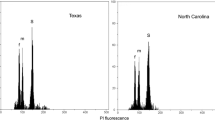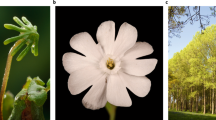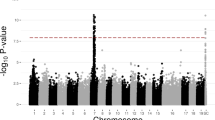Abstract
LEWIS1 classified the English flora according to the frequency and distribution of sex forms in the species, genera and families. There are three basic sex forms in flowering plants and some species may be combinations of more than one of the three. Most flowering plants are hermaphrodite, having both sexes in the same flower. A species which has separate male and female flowers on the same plant is monoecious, and a species with male and female flowers on different individuals is dioecious. Using Black's flora2, the species of the South Australian flora are classified into these sex forms in Table 1.
This is a preview of subscription content, access via your institution
Access options
Subscribe to this journal
Receive 51 print issues and online access
$199.00 per year
only $3.90 per issue
Buy this article
- Purchase on Springer Link
- Instant access to full article PDF
Prices may be subject to local taxes which are calculated during checkout
Similar content being viewed by others
References
Lewis, D., Biol. Rev., 17, 46 (1942).
Black, J. M., “Flora of South Australia” (Government Printer, Adelaide, 1922–52).
Yampolsky, C., and Yampolsky, H., Bibliotheca Genetica, 3, 1 (1922).
Author information
Authors and Affiliations
Rights and permissions
About this article
Cite this article
PARSONS, P. Evolution of Sex in the Flowering Plants of South Australia. Nature 181, 1673–1674 (1958). https://doi.org/10.1038/1811673a0
Issue Date:
DOI: https://doi.org/10.1038/1811673a0
This article is cited by
-
Gynodiœcy in New Zealand Gentiana
Nature (1964)
Comments
By submitting a comment you agree to abide by our Terms and Community Guidelines. If you find something abusive or that does not comply with our terms or guidelines please flag it as inappropriate.



